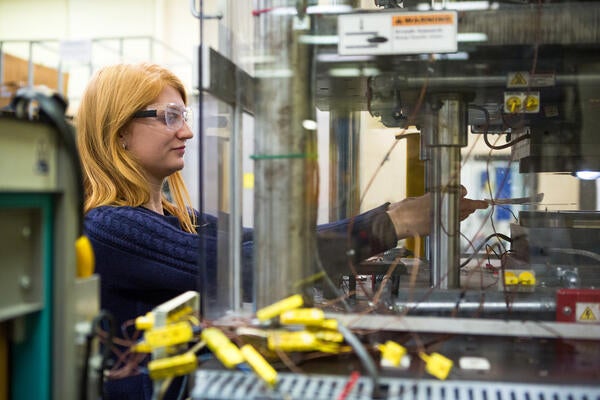
Three Minute Thesis Finals
Grad students have three minutes to present research on everything from black holes to bionic bones at the Three-Minute Thesis competition on campus

Grad students have three minutes to present research on everything from black holes to bionic bones at the Three-Minute Thesis competition on campus
By Staff Graduate StudiesGraduate students present their research at conferences, lab meetings and committee meetings. They can also share their research at the University of Waterloo’s Three-Minute Thesis (3MT) competition.
The innovative event, being held at the Humanities Theatre in Hagey Hall on March 27 from 2:30 until 4 p.m., gives students the opportunity to explain the significance of their research to a general audience in three minutes using one static slide.
Last year’s Waterloo winner
The 3MT competition allows students to “repackage their research in a different way,” says Chau-Minh Phan, last year’s 3MT winner and PhD student in Waterloo's School of Optometry and Vision Science. Phan, who also won the People’s Choice award at Waterloo’s first 3MT competition last year, went on to place third at the provincial competition at Queen’s University.
This year’s provincial competition is hosted by McMaster University. It’s followed by a national competition sponsored by the Canadian Association for Graduate Studies (CAGS).
Be part of the audience
A video of Phan’s 3MT presentation shows him describing how contact lenses and nanoparticles can treat fungal eye infections. This year’s 3MT university-wide finalists come from across the University’s faculties and include research on immigrant adolescents, the effects of weight training on mental health and how gold nanoparticles can colour bacteria.
Be part of the action by selecting the People’s Choice award using iClickers. Join us for the event on Thursday, March 27 from 2:30 until 4:00 p.m. in the Humanities Theatre Hagey Hall.

Read more
The Government of Canada announces funding to support research in food policies and medical devices

Read more
Here are the people and events behind some of this year’s most compelling Waterloo stories

Read more
Research Infosource Inc. recognizes Waterloo’s continued leadership in interdisciplinary research and partnerships to drive impact
The University of Waterloo acknowledges that much of our work takes place on the traditional territory of the Neutral, Anishinaabeg, and Haudenosaunee peoples. Our main campus is situated on the Haldimand Tract, the land granted to the Six Nations that includes six miles on each side of the Grand River. Our active work toward reconciliation takes place across our campuses through research, learning, teaching, and community building, and is co-ordinated within the Office of Indigenous Relations.